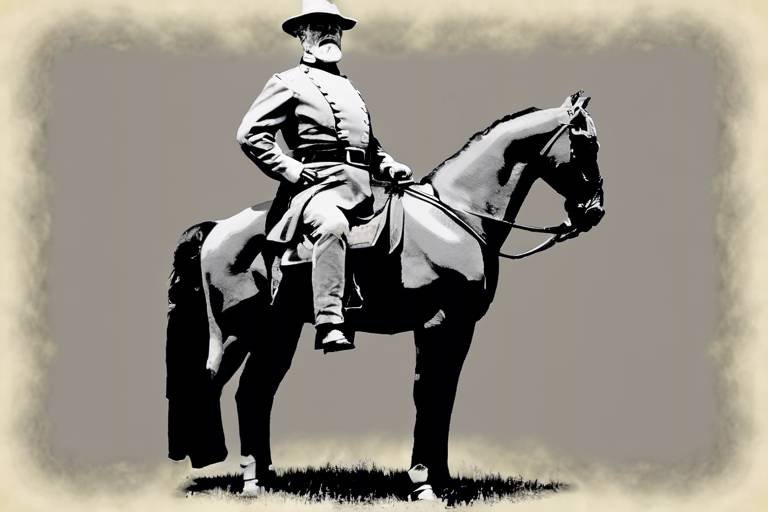Robert E. Lee: The Confederate General
Robert E. Lee, a towering figure in American history, was a Confederate general renowned for his military prowess and controversial views on slavery. Born into a prominent Virginia family, Lee's early life and education laid the foundation for his future leadership roles. His military career in the Confederacy saw him rise to prominence through strategic victories and innovative tactics, shaping the course of the Civil War. Despite the challenges he faced, Lee's legacy continues to spark debates and discussions, especially regarding his post-war efforts towards reconciliation and the enduring controversies surrounding his memory.

Early Life and Education
Robert E. Lee, a prominent figure in American history, was a skilled Confederate general known for his strategic brilliance and controversial views on slavery. Let's delve into his life, military career, and lasting legacy to understand the man behind the uniform.
Robert E. Lee was born into a prestigious Virginia family on January 19, 1807. His father, Henry "Light-Horse Harry" Lee III, was a Revolutionary War hero, influencing young Robert with tales of valor and duty. Growing up surrounded by military tradition, Lee attended West Point Military Academy, graduating second in his class. His education laid the foundation for his future military career, instilling discipline and a strong sense of honor.
Despite his exceptional academic achievements, Lee faced personal challenges, including the death of his father and the responsibility of caring for his family. These early hardships shaped his character, fostering resilience and a deep sense of duty towards his loved ones and his country.
Lee's military education and family background molded him into a principled leader with a strong moral compass. His experiences in his formative years laid the groundwork for the strategic brilliance and unwavering determination he would display on the battlefield.
Throughout his life, Lee remained dedicated to self-improvement, constantly seeking to enhance his knowledge and skills. His commitment to continuous learning and growth set him apart as a leader, inspiring those under his command to strive for excellence.
In conclusion, Robert E. Lee's early life and education were marked by a blend of privilege, tragedy, and a relentless pursuit of excellence. These formative years shaped him into the legendary general whose legacy continues to spark debate and admiration to this day.

Military Career in the Confederacy
Robert E. Lee's military career in the Confederacy was marked by strategic brilliance and significant challenges. As a prominent Confederate general during the American Civil War, Lee played a pivotal role in leading the Southern forces against the Union army. His military expertise and tactical decisions shaped the outcome of key battles and campaigns, earning him a reputation as a skilled commander.
One of the most notable aspects of Lee's military career was his innovative approach to warfare. He implemented bold strategies and maneuvers, often taking calculated risks to outmaneuver his opponents. Lee's leadership style emphasized agility and adaptability, allowing him to respond effectively to changing battlefield conditions and enemy movements.
Throughout the Civil War, Lee faced numerous challenges, including logistical constraints, limited resources, and internal dissent within the Confederate ranks. Despite these obstacles, he managed to achieve several significant victories, such as the Battle of Chancellorsville and the Second Battle of Bull Run, solidifying his reputation as a formidable military leader.
Lee's military campaigns were characterized by his ability to inspire loyalty and dedication among his troops. His charismatic leadership and personal integrity earned him the respect and admiration of his soldiers, who followed him with unwavering loyalty. Lee's presence on the battlefield instilled confidence in his men and boosted morale during challenging times.
Furthermore, Lee's strategic decisions, particularly his invasion of the North during the Gettysburg Campaign, showcased his audacity and determination. Despite the ultimate defeat at the Battle of Gettysburg, Lee's bold offensive demonstrated his willingness to take risks in pursuit of victory, reflecting his unwavering commitment to the Confederate cause.

Battles and Strategies
Robert E. Lee's military career was defined by his innovative strategies and decisive battles during the American Civil War. One of his most famous battles was the Battle of Gettysburg, where Lee's tactical brilliance was put to the test. Despite his strategic acumen, Lee's decision-making at Gettysburg ultimately led to a Confederate defeat, marking a turning point in the war.
Lee's approach to warfare was characterized by boldness and daring, often taking risks to outmaneuver his opponents. The Seven Days Battles in 1862 exemplified Lee's aggressive tactics, where he successfully defended Richmond against Union forces. His ability to adapt quickly to changing circumstances and exploit enemy weaknesses set him apart as a formidable military leader.
One of Lee's key strategies was his reliance on offensive warfare, seeking to take the initiative and keep the Union forces on the defensive. This approach was evident in his campaigns in the Eastern Theater, where he consistently sought to outflank and outmaneuver his adversaries, inflicting heavy casualties and securing crucial victories for the Confederacy.
Despite his tactical brilliance, Lee faced numerous challenges throughout the war, including logistical issues, limited resources, and internal dissent within the Confederate leadership. His ability to navigate these obstacles while maintaining the morale and discipline of his troops showcased his exceptional leadership skills and unwavering commitment to the Southern cause.
In conclusion, Robert E. Lee's battles and strategies during the Civil War reflect his legacy as a skilled military tactician and a controversial historical figure. His innovative approach to warfare and his unwavering dedication to the Confederate cause continue to be subjects of study and debate among historians and military strategists.

Relationship with Confederate Leaders
Robert E. Lee's relationship with Confederate leaders was characterized by a mix of respect, collaboration, and occasional friction. As the commanding general of the Confederate Army, Lee worked closely with prominent figures such as Stonewall Jackson, Jeb Stuart, and Jefferson Davis. His strategic acumen and leadership qualities earned him the admiration of his peers, who often looked to him for guidance and direction on the battlefield.
Lee's interactions with other Confederate leaders were crucial in shaping the course of the Civil War. Despite occasional disagreements over military tactics and strategies, Lee maintained a strong bond with his fellow generals, fostering a sense of unity and purpose within the Confederate ranks. His ability to inspire loyalty and dedication among his subordinates played a significant role in sustaining the morale of the Southern forces during challenging times.
Throughout the war, Lee's relationships with Confederate leaders were marked by a shared commitment to the cause of secession and states' rights. While he respected the authority of political figures such as Jefferson Davis, Lee also demonstrated a willingness to challenge conventional wisdom and pursue bold military initiatives when necessary. His ability to balance strategic pragmatism with a deep sense of duty to the Confederate cause endeared him to both his superiors and his subordinates.

Post-War Life and Legacy
After the Civil War, Robert E. Lee faced a challenging period of transition as he navigated the post-war landscape. Despite his surrender at Appomattox, Lee remained a respected figure in the South and sought to promote reconciliation between the North and the South. He believed in the importance of healing the wounds of war and fostering unity among the divided nation.
Lee's post-war efforts focused on rebuilding his life and the war-torn South. He served as the president of Washington College (now Washington and Lee University) and played a crucial role in transforming the institution into a respected academic center. Lee emphasized the values of education, honor, and leadership, leaving a lasting impact on the students and faculty.
Throughout his post-war years, Lee grappled with the legacy of his actions during the Civil War. While some viewed him as a symbol of Southern pride and honor, others criticized his association with the Confederacy and its defense of slavery. The debate surrounding Lee's character and motivations continues to spark discussions about memory, history, and the complexities of the Civil War era.
As time passed, monuments and memorials dedicated to Robert E. Lee began to appear across the Southern states, commemorating his military leadership and legacy. These tributes served as a way to honor Lee's contributions to the Confederate cause and preserve his memory for future generations. However, the presence of these monuments has stirred controversy and debate, with many questioning their significance in modern society and their impact on historical narratives.
In conclusion, Robert E. Lee's post-war life and legacy are marked by his efforts to promote reconciliation, his contributions to education, and the ongoing debates surrounding his memory. His complex legacy continues to shape discussions about the Civil War, leadership, and the enduring impact of historical figures on contemporary society.

Reconstruction Era
During the Reconstruction Era following the American Civil War, Robert E. Lee faced significant challenges as he navigated the complexities of a nation torn apart by conflict. Lee, known for his military prowess, now found himself in a different role, one that required not just strategic thinking on the battlefield but also diplomatic finesse in rebuilding a fractured country.
As the South grappled with the aftermath of defeat, Lee emerged as a symbol of reconciliation, advocating for unity and healing. Despite his former allegiance to the Confederacy, Lee understood the importance of moving forward together as a nation, rather than dwelling on past grievances.
Lee's efforts during the Reconstruction Era were aimed at fostering a sense of national unity, bridging the gap between the North and the South. His influence extended beyond the battlefield, as he worked towards restoring peace and stability in a nation ravaged by war.
One of Lee's notable contributions during this period was his emphasis on forgiveness and understanding. He believed in the power of forgiveness to heal wounds and bring people together, regardless of their past differences. Lee's stance on reconciliation set him apart as a leader willing to prioritize the greater good over personal vendettas.
Despite facing criticism and scrutiny for his actions during the Civil War, Lee's efforts in the Reconstruction Era showcased his commitment to rebuilding a fractured nation. His legacy during this tumultuous period continues to spark debate and reflection on the complexities of history and the enduring impact of individuals on the course of events.

Monuments and Memorials
Monuments and memorials dedicated to Robert E. Lee are scattered across the United States, serving as controversial symbols of the Civil War era and the Confederacy. These monuments often spark heated debates about history, heritage, and racial tensions in modern society. The most famous of these is the Robert E. Lee Monument in Richmond, Virginia, which stands as a towering tribute to the general's legacy.
While some view these monuments as important historical markers honoring Lee's military prowess and leadership, others see them as glorifying a figure associated with defending slavery and the Confederacy's cause. The ongoing discussions around these memorials raise questions about the appropriate ways to remember and interpret the complex history of the Civil War and its aftermath.
Many argue that these monuments should be preserved as part of the nation's history, serving as reminders of the past and opportunities for education and reflection. Others advocate for their removal, citing concerns about glorifying figures linked to a dark chapter in American history and perpetuating divisive narratives.
As communities grapple with the presence of Confederate monuments in public spaces, the debate continues to evolve, prompting discussions about the role of historical memory, the impact of symbolism on contemporary society, and the importance of acknowledging diverse perspectives on contentious issues.
Frequently Asked Questions
- Who was Robert E. Lee?
Robert E. Lee was a prominent Confederate general during the American Civil War known for his strategic brilliance and controversial stance on slavery. He played a pivotal role in the Confederate Army and is a significant figure in American history.
- What were some key battles that Robert E. Lee participated in?
Robert E. Lee participated in several key battles during the Civil War, including the Battle of Gettysburg, the Seven Days Battles, and the Battle of Antietam. His military tactics and strategies in these battles have been studied and analyzed by historians.
- What is the legacy of Robert E. Lee?
Robert E. Lee's legacy is a subject of ongoing debate and controversy. While some view him as a skilled military leader, others criticize his stance on slavery and his role in the Confederacy. The presence of monuments and memorials dedicated to Lee also sparks discussions about his place in American history.



















